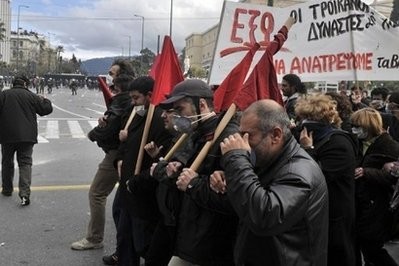Eurozone leaders are expected to agree on greater economic policy coordination Friday as they try to tame a deep-seated debt crisis made worse by markets sceptical that they can stop the rot.
The leaders meet here against a troubled background -- a Libyan crisis destabilising financial markets worldwide makes agreeing policy even more difficult while weaker eurozone states wobble as investors bet against them.

The 17 heads of state or government of the eurozone nations, plus the head of the European Central Bank Jean-Claude Trichet, meet at 1600 GMT to adopt a 'Pact for the Euro' designed to improve the bloc's competitiveness.
The document, seen by AFP, sets out four areas for closer cooperation -- fostering competitiveness, fostering employment, ensuring the sustainability of public finances and reinforcing financial stability.
While specific measures will be the preserve of individual member states -- so as not to offend smaller countries jealous of their independence -- they are all supposed to work towards these same goals.
The objective is "to achieve a new quality of economic policy coordination in the euro area, improve competitiveness, thereby leading to a higher degree of convergence," the document states.
By mutual cross-checking, member states are to ensure that all stick to the agreed course, with tough regular annual summits to review progress.
The logic is that if eurozone states have the same goals and obey the same rules, then the huge debt burdens and public deficits straining public finances and threatening the euro, will ultimately be brought under control.
Germany, Europe's powerhouse economy and guardian of the currency, insists loudly that the euro's current problems stem largely from member states not following the rules on limiting their debt and deficits.
The problem was highlighted sharply when Moody's slashed Greece's debt ratings and then downgraded Spain on Thursday, the latest in a long list of warnings based on fears that some countries may not repay their debts.
"The timing of the downgrade, one day ahead of a eurozone heads of state summit in Brussels, looks like a warning shot to policymakers (to deliver)," RBC Capital Markets analyst Elsa Lignos noted.
Markets tumbled after Moody's announcement, adding to the difficulties Spain and other weaker eurozone countries such as neighbouring Portugal already have in raising fresh funds to cover maturing debt.
The 'Pact for the Euro' is based on plans drawn up by EU President Herman Van Rompuy who softened the edges on a French-German 'Competitiveness Pact' from February which some criticised for trampling over smaller member states.
Eurozone leaders will also be looking at how they can bolster the euro's defences, specifically the debt rescue system set up after Greece had to be bailed out in May last year.
The three-year European Financial Stability Facility is worth notionally 440 billion euros ($610 billion dollars) but in practice, it can only provide half that amount. Making its full capacity available is still an issue.
Its 2013 replacement, the permanent European Stability Mechanism, will have double the firepower but there are difficult debates over its ultimate size and powers, especially whether it can buy up eurozone government debt.
Friday's meeting is supposed to lay the groundwork for a March 24-25 full EU summit and the 'Pact for the Euro' should go some way towards that.
"If there is a good outcome, there will be no problem for the euro," a French diplomatic source said.
If there is not, then "it will be like throwing a grenade into the markets on Monday," the source added.
























